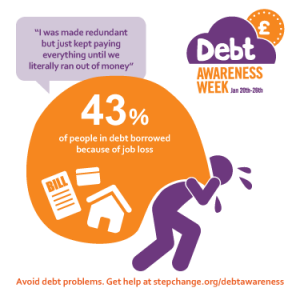A sterling effort: How I reclaimed nearly £1,000 for a mis-sold bank account in less than a day
When our colleague Rob found out he was paying fees for unnecessary...
 As part of Debt Awareness Week we’re discussing the five danger signs to help you avoid them, or if you’ve tried to deal with your finances in this way, how to get help sooner.
As part of Debt Awareness Week we’re discussing the five danger signs to help you avoid them, or if you’ve tried to deal with your finances in this way, how to get help sooner.
One of the more unfortunate danger signs is using a debt to cover living costs following unemployment or ill health. Having a sudden drop in income will always be a huge blow but for some it can be worse than others.
Relying on credit to survive can seem like a lifeline but it can actually make things much worse.
We’ve surveyed our clients and found that 43% of those on a debt management plan had used borrowing to support themselves following illness or unemployment. Relying on credit to cover a sudden drop in income has a clear link to getting into difficulties with your finances.
“I used credit cards to live on, and have been trying to pay them off ever since.”
“We missed payments on all of our bills, were taken to court.and we nearly lost our home.”
“Instead of sorting the problem out when I was unemployed I continued to borrow”
“Used some portion of one loan to pay creditors then used unemployment benefits”
“I increased my overdraft, used doorstep lenders just to eat after I’d maxed out my credit card paying rent”
We’ve identified five simple steps to reduce the chances of a drop in income leading to debt problems.
1. Don’t bury your head in the sand: If things aren’t going your way it can be very tempting to push it to the back of your mind and pretend nothing’s wrong. 41% of our clients wait over a year to get advice, often relying on credit to keep them going.
It can be scary to deal with your finances when things have taken a turn for the worse but it will definitely work out better than pretending nothing’s happened.
2. Cut back on your non-essential costs: Most of us spend money on things that are nice to have but not essential. If you’ve less money coming in then it’s a good idea to start looking at reducing the money going out wherever you can.
Start with the obvious stuff like downgrading your TV packages and movie rental services. Then start snuffling around for any things you pay for but don’t need. Looking through your direct debits on your bank account can be a good way to work out if you’re paying for something that you don’t need.
While it might be tough to give up some of your luxuries, it will put you in a stronger postion in the long run and could be the difference between relying on credit to live or being able to manage.
3. Focus on paying the most important bills: Have you ever seen a mother bird with one worm and lots of hungry chicks to feed? That’s how it can feel when you’ve got more bills than your money can cover. Just like that bird will make sure the worm goes to the chick that needs it most, you need to make sure that your money goes to the most important place.
Keeping a roof over your head and having food to eat are the most important things, so it’s important to make sure your money goes on these things first. This might mean falling behind on other bills but we can give you advice about how to deal with this.
4. Make sure you’re receiving all the benefits you’re entitled to: This one might seem obvious, but we speak to many people that aren’t getting all the money that’s available to them. If your income drops then it’s quite possible that you’ll become eligible for some sort of welfare benefits.
Our online benefits checker will take your details and tell you if you’re eligible to claim any extra money.
5. Talk: If you know you’re going to struggle to pay some of your bills then we’d recommend you make some phone calls and let these companies know you’re going to fall into arrears.
Not all companies will be willing to help you out when you’re struggling, but if you don’t ask then none of them will! If you explain that you’ve fallen on hard times and ask if there’s any help available then there’s a good chance they’ll be helpful to you.
If you’re using credit to support yourself following after a reduction in income, you need debt advice.
Try our StepChange Debt Danger Signs tool to see how many apply to you, how to avoid the others, and how we can help with free and impartial debt advice.
Client quotes and statistics obtained in debt danger signs survey, Dec 2013.
Responses